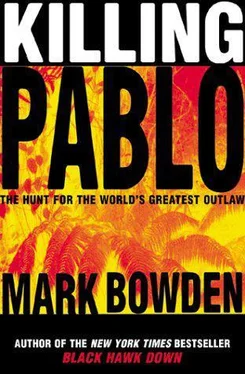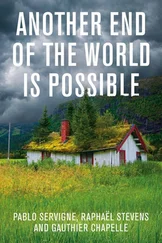Mark Bowden - Killing Pablo - The Hunt for the World's Greatest Outlaw
Здесь есть возможность читать онлайн «Mark Bowden - Killing Pablo - The Hunt for the World's Greatest Outlaw» весь текст электронной книги совершенно бесплатно (целиком полную версию без сокращений). В некоторых случаях можно слушать аудио, скачать через торрент в формате fb2 и присутствует краткое содержание. Жанр: Старинная литература, на английском языке. Описание произведения, (предисловие) а так же отзывы посетителей доступны на портале библиотеки ЛибКат.
- Название:Killing Pablo: The Hunt for the World's Greatest Outlaw
- Автор:
- Жанр:
- Год:неизвестен
- ISBN:нет данных
- Рейтинг книги:3 / 5. Голосов: 1
-
Избранное:Добавить в избранное
- Отзывы:
-
Ваша оценка:
- 60
- 1
- 2
- 3
- 4
- 5
Killing Pablo: The Hunt for the World's Greatest Outlaw: краткое содержание, описание и аннотация
Предлагаем к чтению аннотацию, описание, краткое содержание или предисловие (зависит от того, что написал сам автор книги «Killing Pablo: The Hunt for the World's Greatest Outlaw»). Если вы не нашли необходимую информацию о книге — напишите в комментариях, мы постараемся отыскать её.
Killing Pablo: The Hunt for the World's Greatest Outlaw — читать онлайн бесплатно полную книгу (весь текст) целиком
Ниже представлен текст книги, разбитый по страницам. Система сохранения места последней прочитанной страницы, позволяет с удобством читать онлайн бесплатно книгу «Killing Pablo: The Hunt for the World's Greatest Outlaw», без необходимости каждый раз заново искать на чём Вы остановились. Поставьте закладку, и сможете в любой момент перейти на страницу, на которой закончили чтение.
Интервал:
Закладка:
Martinez remained commander of the Search Bloc. Neither he nor any member of the unit was ever prosecuted, and U.S. support for the Escobar manhunt never wavered.
Colombian Police Col. Oscar Naranjo, then intelligence chief of the National Police and now chief of analysis for the Ministry of Defense, said in an interview that Los Pepes had worked closely with the Search Bloc.
"The Pepes were a desperate option after Pablo Escobar had generated so much violence in Medellin," Naranjo said. "Old partners of Escobar's got together to offer their services to the government. For the high-ranking officers of the police and government, their relationship with the Search Bloc was kept deliberately unclear, but people celebrated the actions of Los Pepes at all levels of the government. They and the Search Bloc acted on information gathered by the U.S. Embassy, and the Colombian army and police."
Toft's Aug. 3, 1993, cable said: "At this point, according to de Greiff, police officials were probably already too deeply involved with Los Pepes to withdraw. The witnesses' testimony indicates that not only were some members of the Bloque and Los Pepes running joint operations, some of which resulted in kidnappings and possibly killings, but that the leadership of Los Pepes was calling the shots, rather than the police."
There is other evidence of cooperation between the Search Bloc and Los Pepes.
Fidel Castano, a colorful and ruthless Colombian paramilitary leader known as "Rambo" who at one time had helped Escobar ship cocaine and who was killed in 1994 fighting against Marxist guerrillas, acknowledged publicly to reporters before his death that he was a founding member of Los Pepes. He and his brothers turned against the drug boss after he murdered their associates, he said.
In a dispatch to DEA headquarters on Feb. 22, 1993, DEA agent Javier Peña in Bogota identified Castano as "a cooperating individual who was once a trusted Pablo Escobar associate." Peña noted that Castano had valuable connections with the Colombian drug underworld. The cable went on to detail a recent Search Bloc raid on a suspected Escobar hideout that had been led by Castano.
Castano's connection with the Search Bloc was noted in another DEA memo, written in September 1993 by agent Steve Murphy.
A Colombian pilot and former drug trafficker, who asked to be identified only as Rubin, said he was associated with the death squad but stopped short of saying he was a member.
Rubin said one leader of Los Pepes, a man he identified only as "Bernardo" or "Don Berna," had worked for two Medellin drug bosses who had been murdered by Escobar. Two DEA agents said they were familiar with Bernardo, who lived with other members of the group in a house just outside the gate to the Search Bloc headquarters in Medellin. They said they witnessed his regular association with Search Bloc commanders.
Toft, who resigned as Bogota DEA chief months after Escobar was killed to protest growing links between drug dealers and the Colombian government, said the entire effort to track down Escobar was tainted by association with criminal elements.
"On the day Escobar was killed, there were all these celebrations in Bogota," Toft said. "I went to the parties. Everybody was drinking champagne and slapping each other on the back, and the whole time I had this knot in my stomach. I was happy we had gotten Escobar, but at what price? It took away a lot of the joy."
As the manhunt intensified in 1993, two high-level Pentagon officials began to express concerns about potential violations of Presidential Executive Order 12333, which originated during the Nixon administration after congressional hearings exposed excesses in the intelligence community. It has been updated under Presidents Jimmy Carter and Ronald Reagan.
The order states: "No person employed by or acting on behalf of the United States Government shall engage in, or conspire to engage in, assassination." It adds: "No agency of the Intelligence Community shall participate in or request any person to undertake activities forbidden by this Order."
Concerns about potential violations of the order prompted Lt. Gen. Jack Sheehan of the Joint Chiefs of Staff to recommend the withdrawal all American military forces from Colombia in November 1993, just weeks before Escobar was killed. At the time, Sheehan was in charge of all U.S. military operations overseas.
Sheehan said he made the recommendation after two CIA analysts briefed him at the Pentagon about suspected links between the Search Bloc, Los Pepes and American forces in Colombia.
The analysts, according to Sheehan, noted that the tactics employed by Los Pepes were similar to those being taught to the Search Bloc by Delta Force; that intelligence gathered by U.S. forces was being shared with the death squads; and that Delta Force operatives were overstepping their deployment orders by accompanying Search Bloc members on raids.
Sheehan's recommendation was supported by Brian Sheridan, deputy assistant secretary of defense for drug enforcement policy and support.
When he learned of Sheehan's recommendation, Busby was angry. He said he "used my influence" in Washington to try to keep the troops in Colombia. According to Sheehan, the ambassador phoned the White House from Bogota and enlisted support from the National Security Council.
"They all lined up against pulling our guys out," Sheehan said. "I thought this thing had gone way past the original deployment order, and I didn't like the way it looked at all. For Busby and the others, it was an ends-justifies-the-means kind of thing. I was opposed to it, as was anyone who takes seriously the importance of civilian control over the military."
Busby said he believed the CIA analysts who made the report to Sheehan had been "misinformed" about the seriousness of the evidence linking the Search Bloc and Los Pepes.
"We had made promises to President Gaviria that I felt we were obligated to keep," Busby said. "I was not about to abandon him at that late date. It was too important to him and us. I was also, frankly, angry that I had not been consulted."
In the end, the Pentagon ordered the covert units in Colombia - Centra Spike and Delta Force - replaced by unclassifed special forces. The changeover had not been completed by the time Escobar was killed on Dec. 2, 1993.
When Los Pepes had publicly surfaced earlier that year, Clinton had just assumed office. There is no indication that suspicions of American involvement with the vigilantes ever reached him.
A senior Pentagon official said of the manhunt: "There's no question that things down there got ugly. Pablo Escobar was like a man standing on top of a mountain . . . consisting of every family member, business associate, friend and admirer he had built up over 40 years. And ultimately the only way to get at him was to take down the mountain, one person at a time, until Pablo had no place left to hide."
A former American army officer who took part in the manhunt called the effect of Los Pepes "very significant."
"They were stunning," he said. "There was no question in my mind that they were acting on information we gathered. It made it more and more difficult for him to hide. As more and more people were killed, he became terrified for his family. Ultimately, that was what enabled us to find him."
Months after Escobar's death, former Bogota DEA chief Toft released surveillance tapes showing that cocaine traffickers in the Colombian city of Cali had helped finance the presidential campaign of Gaviria's successor, Ernesto Samper. Toft said he believed the hunt for Escobar actually helped create the alliances that today bedevil the country.
Gaviria said that from his standpoint, "the battle against Pablo Escobar was never primarily about stopping drug smuggling.
Читать дальшеИнтервал:
Закладка:
Похожие книги на «Killing Pablo: The Hunt for the World's Greatest Outlaw»
Представляем Вашему вниманию похожие книги на «Killing Pablo: The Hunt for the World's Greatest Outlaw» списком для выбора. Мы отобрали схожую по названию и смыслу литературу в надежде предоставить читателям больше вариантов отыскать новые, интересные, ещё непрочитанные произведения.
Обсуждение, отзывы о книге «Killing Pablo: The Hunt for the World's Greatest Outlaw» и просто собственные мнения читателей. Оставьте ваши комментарии, напишите, что Вы думаете о произведении, его смысле или главных героях. Укажите что конкретно понравилось, а что нет, и почему Вы так считаете.












